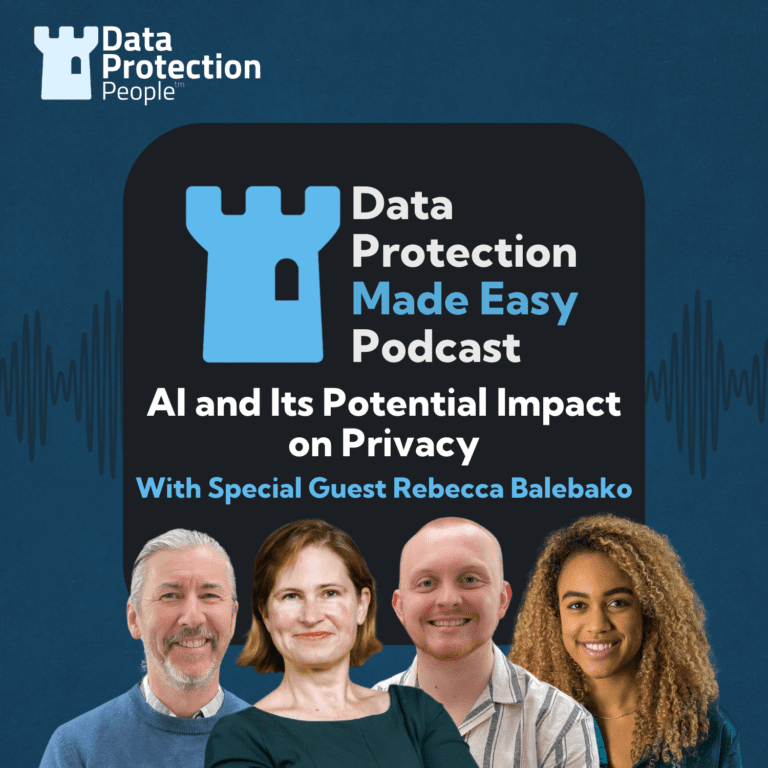AI and Its Potential Impact on Privacy
Myles Dacres
Written by Myles Dacres
In our upcoming discussion on the Data Protection Made Easy podcast our hosts discuss AI and Its Potential Impact on Privacy

Data Protection Made Easy Podcast: AI and Its Potential Impact on Privacy
Join us for a ground-breaking episode as we delve into the fascinating world of Artificial Intelligence (AI) and its implications for data privacy!
Mark your calendars! We’re excited to welcome back Rebecca Balebako, a Privacy Engineer and the founder of her own privacy-focused software engineering organisation, Privacy Engineers (https://www.privacyengineer.ch/), for her second appearance on the Data Protection Made Easy podcast!
Rebecca, along with our esteemed Data Protection People podcast hosts, will engage in a lively discussion specifically tailored to our audience of data protection enthusiasts and practitioners.
The Privacy Problem with AI: Are We the Last to Know?
This episode tackles a critical but often overlooked concern: the potential risks AI poses to data privacy within organisations. We’ll explore how the privacy department can sometimes be left out of the loop regarding AI implementation, potentially leading to unforeseen consequences for data handling practices.
The Rise of AI in the UK: A Double-Edged Sword
As organisations across the UK actively embrace AI solutions, a crucial question emerges: how will this widespread adoption impact data privacy regulations and practices? We’ll delve into this complex issue, exploring both the potential benefits and challenges associated with AI’s rise.
Combating AI Risks: Your Guide to a Privacy-Conscious Future
Empowering our audience is paramount. This episode equips you, the data protection professional, with the knowledge and strategies needed to combat the potential risks AI poses within your organisation.
Rebecca Balebako, our AI and Privacy Expert, Shares Her Insights:
- Harnessing the Power of Privacy-Conscious AI Design. Rebecca will discuss her experience working with organisations developing AI software and how she ensures privacy is built into the very foundation of these technologies.
- Identifying and Mitigating AI’s Privacy Threats. We’ll explore the potential pitfalls of AI, including data breaches, biased algorithms, and heightened surveillance capabilities. Rebecca will provide real-world examples of how AI can be misused and the consequences it can have.
- Striking the Perfect Balance: Innovation Meets Privacy. This episode equips you with the tools to navigate the complex landscape of AI development. We’ll discuss strategies for organisations to responsibly implement AI solutions while simultaneously safeguarding individual privacy. Rebecca will share her top tips and expert insights on achieving this critical balance.
- Best Practices in Action: Building Privacy-Enhancing AI. Learning from the best is key. We’ll showcase concrete examples of best practices currently being employed in the development of privacy-enhancing AI.
Live Audience Q&A: Your Chance to Ask the Experts
An engaging live audience Q&A session is your opportunity to delve deeper into the topics you care about most. Don’t hesitate to submit your questions through the chat function! Our expert panel, including Rebecca Balebako, will be here to provide insightful and practical answers to your concerns about AI and data privacy.
This episode promises to be a fascinating exploration of the intersection between AI and data privacy. Reserve your spot or subscribe today.
Key Details:
- Date & Time: Friday, May 24th, 2024 | 12:30 PM – 1:30 PM BST
- Format: Live discussion with audience Q&A via chat function
Listen to previous episodes of the Data Protection Made Easy podcast on Spotify.
Get Support With Data Protection And Cyber Security
Our mission is to make data protection and cyber security easy: easy to understand and easy to do. We do that through the mantra of benchmark, improve, maintain.
